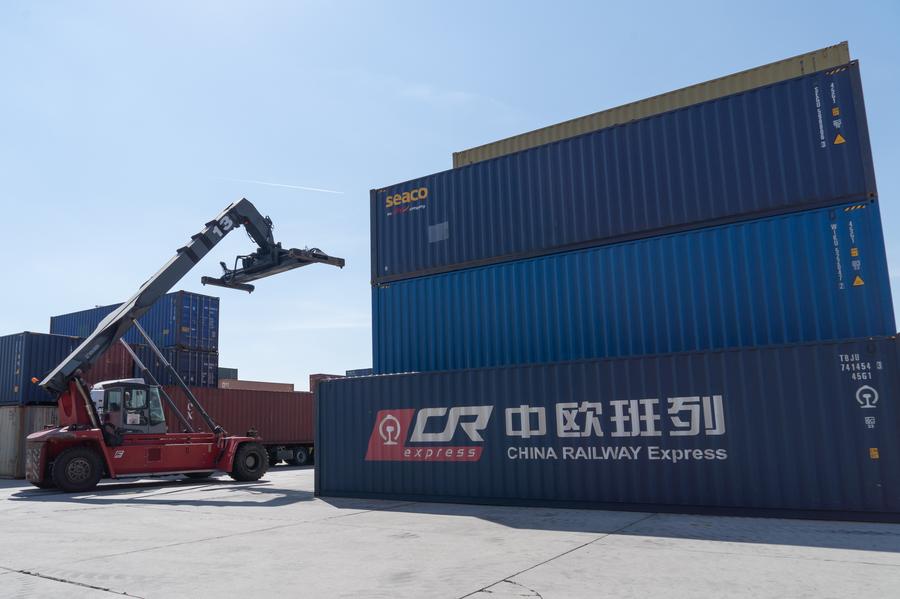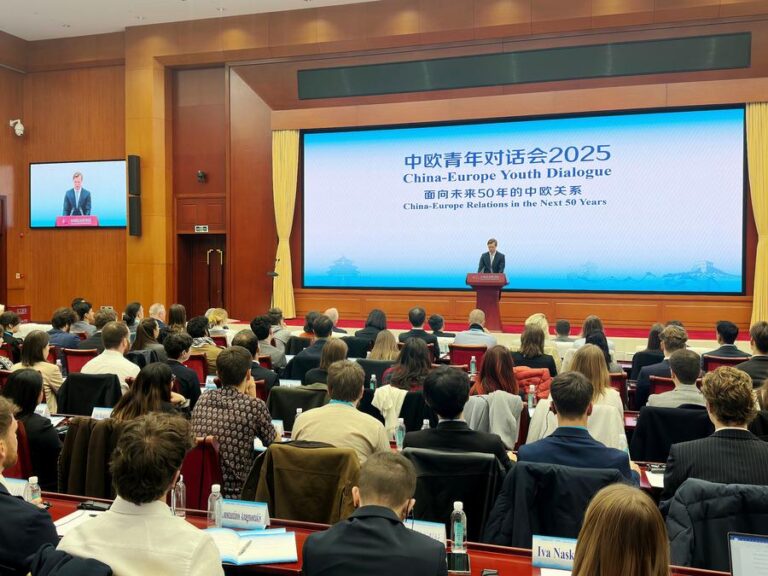BEIJING, Nov. 19 (Xinhua) — After a six-day visit to China, German graduate student Fridolin Kollmar has brought back not only eye-opening memories, but also golden business opportunities.
More than just a student, Kollmar came to China as the seventh generation of his family’s packaging paper machinery business. Founded in 1842, the German manufacturer has opened a small workshop near Shanghai and is seeking to expand its business in China.
Planning to join his family business after graduation, the young successor saw significant opportunities for the company during his trip. “China has a rapidly expanding market for sustainable packaging materials,” he said, being excited about closer cooperation with China in his future career.
Kollmar was among 60 European youth from 30 countries who gathered with their Chinese peers at the China-Europe Youth Dialogue 2025 in Beijing on Monday to discuss their roles in building closer China-Europe ties as the two sides celebrate the 50th anniversary of their diplomatic relations.
“Young people, with their openness and inclusiveness, are the best envoys for breaking down cognitive barriers,” said Zhao Rui, vice president of the Chinese Academy of Social Sciences (CASS), the host of the event, at the opening ceremony of the conference.
Before the dialogue, the European delegation spent five days in Hangzhou, visiting leading tech companies and research institutions, and experiencing traditional Chinese culture in rural villages.
During the conference, Chinese and European youth engaged in dialogues on topics such as cultural exchanges and the exchange of civilizations, as well as sci-tech and economic cooperation.
“One area where I hope to see more collaboration is research and technology,” Antonia Baumgartner, a freelance journalist from Austria, told Xinhua. It is her first time in China, and she has witnessed the country’s progress in some high-tech fields.
“Technology is closely linked to research, and with so many innovations emerging, and with global challenges to face, it is not productive to think only within national boundaries,” she noted.
Regarding manufacturing and trade, Kollmar noted that Germany and China are two major industrial economies that rely heavily on each other. “Mutual dependence makes continued partnership essential,” he said.
Over the past half-century, China-EU relations have made significant progress, with bilateral trade in goods reaching 785.8 billion U.S. dollars in 2024. The two sides are each other’s second-largest trading partners, and they cooperate across politics, the economy, culture, energy, and science and technology.
Speaking of future potential, Ma Linhe, an assistant research fellow at CASS, mentioned that China and Europe face many common challenges today, such as industrial transformation, employment, an aging population and environmental protection. “I’m confident that young people from both sides can explore solutions together and learn from each other’s experiences,” he said.

In lively discussions, participants from both sides agreed that beyond being partners, the future of China-Europe relations lies more deeply in friendship and genuine people-to-people connections among the youth.
Zhang Jiarui, a PhD candidate of the University of CASS, shared how cultural symbols like the popular “Labubu” IP toy help spark friendships across continents. As Chinese culture gains wider international recognition, she said, it brings young people closer.
“I do hope that we don’t see each other as countries anymore, but as people, as the friends behind the flags,” said Oliver Meyer, founder and CEO of Storabble Group AG. “We should approach each other with the desire to understand and the willingness to maintain the friendship that we built here.”
While addressing the opening ceremony, Grzegorz Kolodko, former deputy prime minister of Poland, noted that there is greater trust among younger generations and, hence, greater hope of making changes for the better.
“Today, we are witnessing so many tensions. Youth should create spaces where cooperation becomes possible, rather than rivalry,” Baumgartner said.
Stressing the significant role of youth in shaping a bright future, Jonathan Schwestka, parliamentary assistant at the European Parliament, said young people can advance China-Europe relations by deepening mutual understanding, strengthening academic and cultural exchanges, and promoting business partnerships and joint innovation.
Currently continuing his studies, Kollmar is learning Chinese to enhance communication and prepare for future cooperation. “I am confident I will have the chance to work closely with China in the future,” he said. ■

